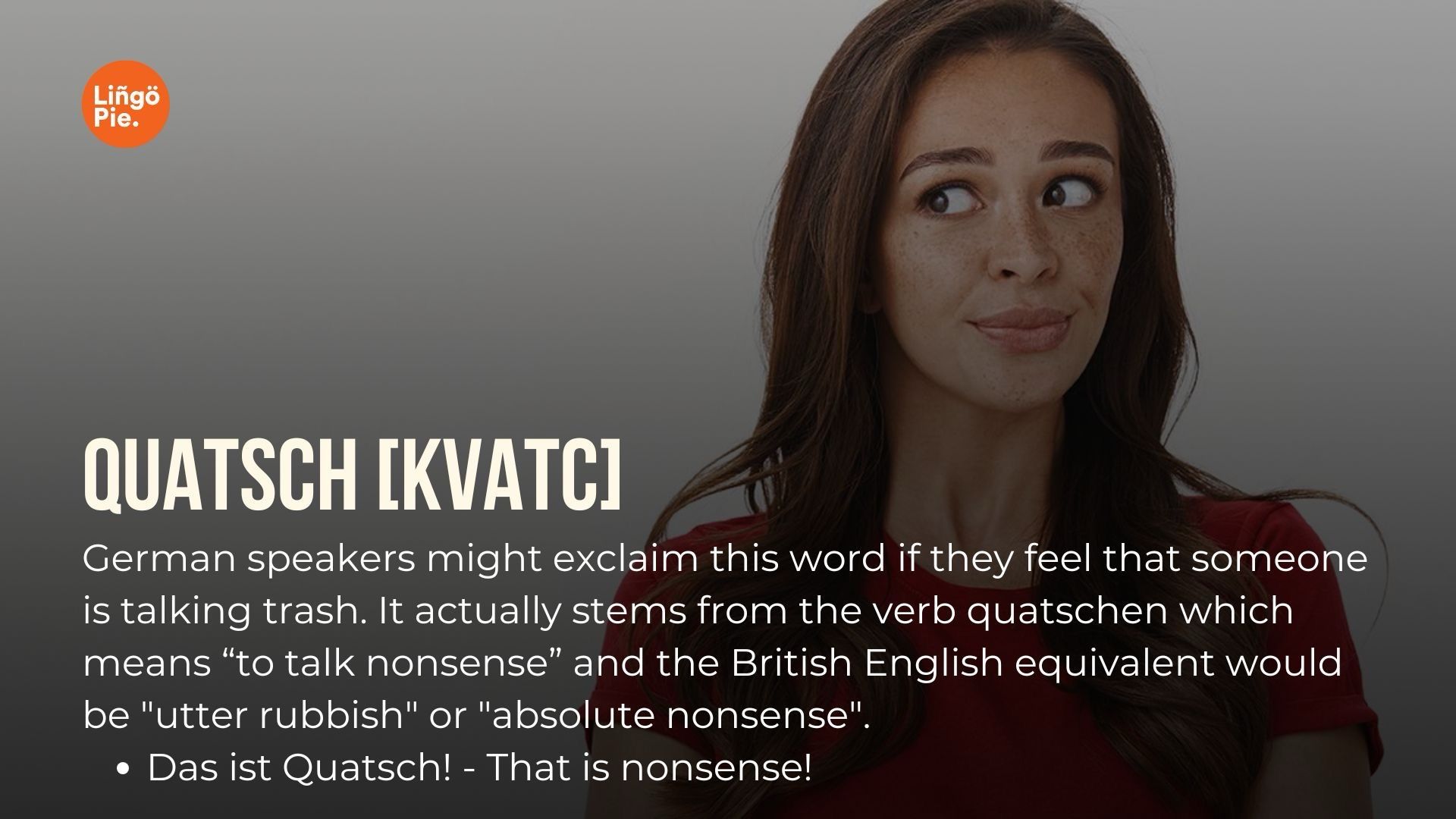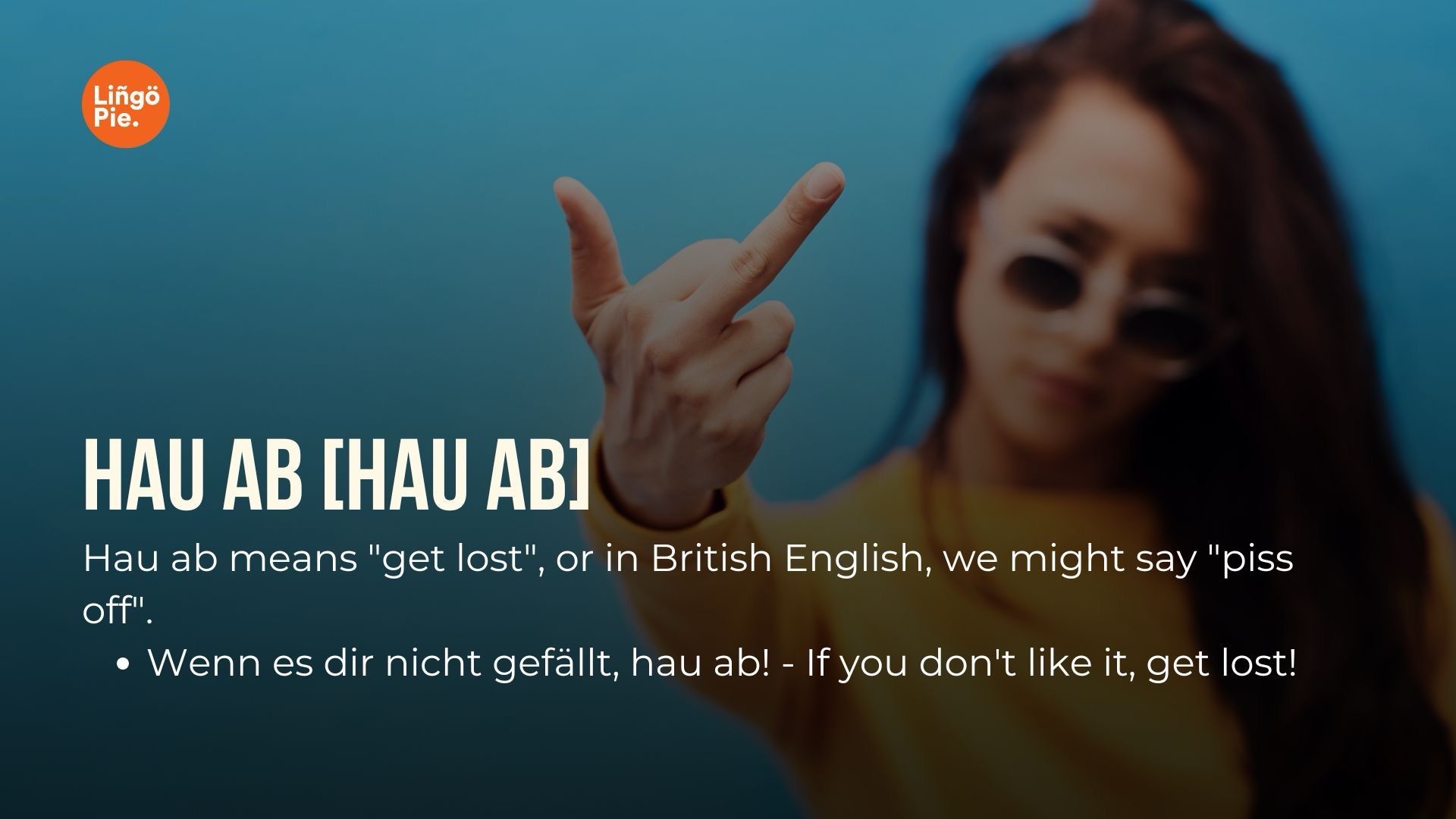Sick of sounding like you swallowed a German textbook? If you want your German language skills to sound sharp, smooth, and utterly authentic, it's time to practice some German slang. You know... those colorful, casual terms and phrases are how real German natives actually talk on the streets, in the clubs, and amongst friends!
In this guide, we'll equip you with 20 of the most wildly popular, insanely useful German slang words and phrases. Ones that'll have you dishing out compliments, firing back witty comebacks, and navigating casual conversations like a seasoned local.
Let’s dive right in!
Best Way to Learn German as a Beginner
How To Say Thank You In German? 18 Natural Ways
German Curse Words 101: Using German Swear Words Like a Pro

Why Learn German Slang?
Learning slang is one of the most practical ways to achieve true conversational fluency and cultural immersion. Here's why these casual, informal phrases are an absolute must:
- Sound Like a Native: Textbooks teach proper grammar, but slang is how real Germans actually communicate in everyday life. Using it helps you sound credible instead of robotic.
- Connect with the Culture: Slang provides a vibrant window into the local culture, humor, and values. Expressions often have fascinating etymologies rooted in history.
- Boost Comprehension: Many slang terms lack literal translations. Grasping the implied meanings and nuances proves you're operating at an advanced level.
- Stay Relevant: Unlike formal speech, slang vocabulary constantly evolves. Knowing the latest lingo keeps your German skills modern and relatable.
- Have More Fun!: Let's be honest - slang phrases are often hilariously random. Mastering quirky terms like "Bauerntrampel" and "Erddeppchen" injecting life into the language.
One of the best ways to learn German slang is to go to Germany and immerse yourself in the language and culture. You can also try to read German, listen to music, and absorb the language organically.
But in our experience?
The best way to learn German slang is by watching TV and movies in German to develop your language skills and pick up new expressions. Visit Lingopie to stream entertaining German language content optimized for language learning.
20 German Slang Words and Phrases

1. Servus

You will hear this greeting, which actually means “goodbye” and “hello”, in Bavaria, a region in the South of Germany with its own distinct vocabulary and accent.
This is a very casual way to greet someone you know well, and it is often used by teenagers.
2. Alter
Alter is a versatile slang word that can mean different things depending on the context. One of the translations of this term is "dude" or "mate". You can use this to greet a friend, or as an interjection in a conversation to convey surprise or grab attention.
- “Alter! Rat' mal, was ich gerade gesehen habe!” - Man! Guess what I just saw!
When paired with the word schwede, however, it becomes an expression of shock. The literal meaning of alter schwede is "old Swedish man", but it is used like "my goodness" or "gosh!".
- Alter schwede! Was hast du gemacht?” – My God! What did you do?
3. Mahlzeit
This is a German greeting that literally means "mealtime". However, when a German person greets you in this way, it is like saying "good morning" or simply "hey". The word comes from the more formal greeting Gesegnete Mahlzeit, meaning "blessed mealtime".
So, using the above three German slang words, we can make a short informal exchange between two friends.
- Mahlzeit Alter, was geht? - Hey dude, what's up?
- Servus! Bei mir läufts, und bei dir? - Hi! It's going good, and with you?
4. Assi
This slang term is an abbreviation of the German word asozial, meaning "antisocial". Assi is a pejorative slang word that roughly translates in English to "trashy" or, in British English, "chavvy".
This word is used as an adjective to describe someone's perceived personality traits or as a noun for a person who exemplifies these things.
For example, a German might use assi to talk down on a person for having bad manners, being uneducated, unemployed, or uncouth.
- Junge Leute, die rauchen, sind assi - Young people who smoke are trashy
5. Hammer

Hammer can also be added to a word like a superlative to emphasize it. For instance, hammergeil is "extremely cool", while hammerscheiße means "really sh*t".
- Ich ess nur hammerselten Döner - I eat kebab very rarely
6. Mach's Gut
Literally, this phrase means "make it good" or "do it well", but we would translate it in English as "have a good one" or "take care".
This is a casual farewell among people who are friends or family. You can say mach's gut instead of auf wiedersehen.
As a response, your friend might say du auch, “you too!”, or mach's besser, which literally means “do it even better”.
- Bis morgen, mach’s gut! - See you tomorrow, have a good one!
7. Spinnen
When a German person wants to express the feeling that they are going crazy, they can say they are making spider's webs, or spinnen. This term is used informally and it is similar to "I'm going nuts" or "I'm losing it".
- Ich glaube, ich spinne - I think I'm going nuts
8. Na

In fact, saying na in isolation to your friend and having it repeated back to you constitutes a whole conversation.
If your friend greets you with an elongated naaa? this means "hey, how are you?", to which you can simply reply na, meaning "hey, I'm good, how are you?" This is similar to the English greeting "sup", which is used for "hey", but is also an abbreviation of "what's up?"
You can also add a "how are you?" after na if you want to give a more wordy salutation.
9. Na Ja
The versatility of the German word na is great. Na ja is a very useful little saying that roughly translates as "well" in English. You will often hear na ja at the beginning of a sentence to soften what comes next or to preface a disagreement.
- Hans ist so nett! - Hans is so nice!
- Na ja, so nett ist er auch nicht - Well, he isn't that nice
You can also use na ja as a response to "how are you?"
- Guten Tag! Wie geht es dir? - Hello! How are you?
- Na ja… - So-so…
There are several other little sayings that can be made from na, such as na, schön, meaning "okay then" and na klar, "of course".
10. Alles Klar
Klar is another useful one to know. This word means "clear", "plain", or "understood". You can use this word to ask "is everything okay?" colloquially.
- Na, alles klar? - Hey, all good?
- Ja, alles klar, danke, und bei Dir? - Yes, all good, thanks, and you?
11. (Ist) Gebongt
This is a quick way to say you agree with something and it is settled, rather like the English sayings "okay-dokey", "righty-o" and "ok, agreed".
The verb bongen refers to ringing something up on a register, thereby settling a transaction. If something is gebongt, it means it is booked, decided, or agreed upon.
- Treffen wir uns morgen früh im Café? - Shall we meet tomorrow morning in the café?
- Ist gebongt - Sure
12. Auf Jeden Fall
If you want to wrap up a thought, you can use this handy German saying, which translates as "in any case". You can also shorten it to auf jeden and the phrase has the exact same meaning.
What's more, if you change jeden to keinen, it means “in no case.” This is a super useful and natural-sounding phrase to have in your repertoire.
13. Aus der Reihe tanzen
Someone who acts a little outside of the norm and stands out from the crowd in Germany can be described as dancing outside of the line. This can be used both in a positive and negative way. Someone who dances outside the line might be a troublemaker, or simply quirky.
- Mein Cousin tanzt immer aus der Reihe - My cousin is always stepping out of line
14. Quatsch

German speakers might exclaim this word if they feel that someone is talking trash.
15. Bock Haben
This is a very useful little German phrase, which means you want something or you have an interest in doing something. More formally, Germans might say Lust haben, which means "feel like", and Bock haben is the more colloquial alternative.
Bock comes from an old language called Rotwelsch, used by people on the outskirts of society in parts of Germany and Switzerland. They borrowed the words der Bock from the Romani word bokh, meaning "hunger". So, Bock haben is to hunger for something.
- Ich hab' Bock auf’s essen - I really want to eat
16. Auf den Keks gehen
This translates literally as "you are getting on my biscuit", which means "you are getting on my nerves". Native speakers in any German-speaking country will understand this saying, so it's a great one to know.
- Dein lautes Kauen geht mir auf den Keks - Your loud chewing is irritating me.
17. Besserwisser
This hilariously literal slang term is the German equivalent of "know-it-all". Besserwisser means "better knower" and it conveys the idea that someone always has an answer and feels superior in their knowledge to those around them.
- Der Besserwisser zeigt uns wie es geht - The know-it-all will show us how to do it
18. Moin Moin
Short for Guten Morgen, or "good morning" in parts of northern Germany, moin moin is a very colloquial and casual greeting.
This German phrase can actually be used to say "hi", "good morning" and "goodnight", depending on the context. It is yet another versatile greeting that is good to know if you are visiting Hamburg or the surrounding areas.
19. Hau Ab

If you are ever in need of German expressions that suggest anger or frustration, this is an easy one to start with.
20. Zwielicht
Finally, this funny German slang word translates literally as "twilight", however, it is meant to describe something or someone as “shady” or “dodgy.”
- Er is ein zwielichtigen Kerl - He is a shady dude
Other German Slang Phrases
Once you've mastered the basics, it's time to elevate your German slang game. Here are some of the best slang phrases to try out:
| German | Literal Translation | Actual Meaning |
|---|---|---|
| Alles Gute zum Geburtstag | All the best for the birthday | How to wish someone a happy birthday |
| Auf dicke Hose machen | To act like you have fat pants on | Behaving arrogantly or showing off |
| Bock haben | To have a buck/goat | Feeling like doing something |
| Das Leben ist kein Ponyhof | Life isn't a place for riding ponies | Saying that life comes with difficulties and challenges |
| Die Nase voll haben | To have your nose full | To be really annoyed or sick of something |
| Jetzt geht's um die Wurst | Now it's about the sausage | Crunch time, the critical moment |
| Na ja... | Well, yeah... | A filler phrase expressing indecisiveness |
| Nicht alle Tassen im Schrank haben | Not having all the cups in the cupboard | Calling someone crazy/not right in the head |
| Nur ein Schwein trinkt allein | Only a pig drinks alone | Encouragement to join in drinking with others |
| Was geht ab? | What's going off? | Casual way to ask "How are you?" |
Why It is Important to Know Slang
If you want to speak German like a native, you will need to learn colloquialisms, slang, and even curse words. This is the best way to sound authentic and natural in everyday conversation.
Knowing slang words and phrases will also help you to understand social situations better, as well as TV shows, movies, and music.
For instance, if a German person says to you ich verstehe nur Bahnhof, this literally means "I only understand train station."
This is confusing if you don't know it's a slang term that means you have no idea what someone is saying, similar to the English "it's all Greek to me."
See also: A Guide to German Verbs for Beginners
FAQs: Learning German Slang Words and Phrases
1. What are slang words for Germans?
Popular slang words for Germans include "Krauts" (historically used but now considered outdated or offensive), "Teutons," and "Schwab" (specific to Swabians). However, it's important to use these terms with caution, as some can be seen as disrespectful.
2. What are the top 5 German phrases?
The top 5 German phrases to know are:
- "Alles klar?" (Everything okay?)
- "Wie geht's?" (How’s it going?)
- "Kein Problem" (No problem)
- "Viel Glück!" (Good luck!)
- "Das ist super!" (That’s great!)
3. What is slang for cool in German?
The slang word for "cool" in German is "geil" or "krass." Both are commonly used among younger generations to describe something awesome or exciting.
4. What is a famous German swear word?
A famous German swear word is "Scheiße" (pronounced "shy-za"), which translates to "shit" in English. It’s widely used in moments of frustration or anger.
5. What is the F-word in German?
The German equivalent of the F-word is "ficken," though it’s considered very vulgar. A milder alternative is "verdammt" (damn), which is less offensive but still expresses frustration.
By addressing these common questions, this FAQ section is optimized for SEO, targeting key queries related to German slang and phrases while providing clear, engaging answers.
Summing Up: German Slang Words and Phrases
This list of German slang phrases and words is not exhaustive, but it is a great place to start building your colloquial vocabulary for small talk and casual settings.
Learn to use these words in a natural context to sound authentic when you speak with natives.
You can gain a deeper understanding of casual German by engaging with books, music, TV shows, and movies made by German speakers. Moreover, remember you can learn German skills like listening and pronunciation from streaming TV and movies in German. Lingopie is a great resource for learners.
See also: The 6 Best Songs to Learn German
Mach's gut!





![Can You Pronounce These Old French Names? [French Language Day Quiz]](/blog/content/images/size/w1200/2025/03/Lingopie-Extension-2.jpg)



